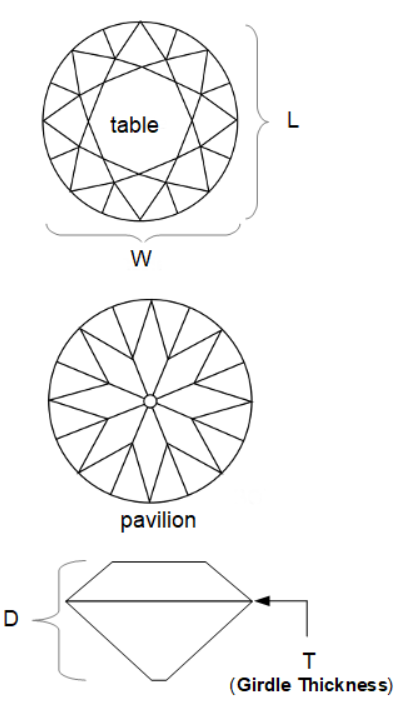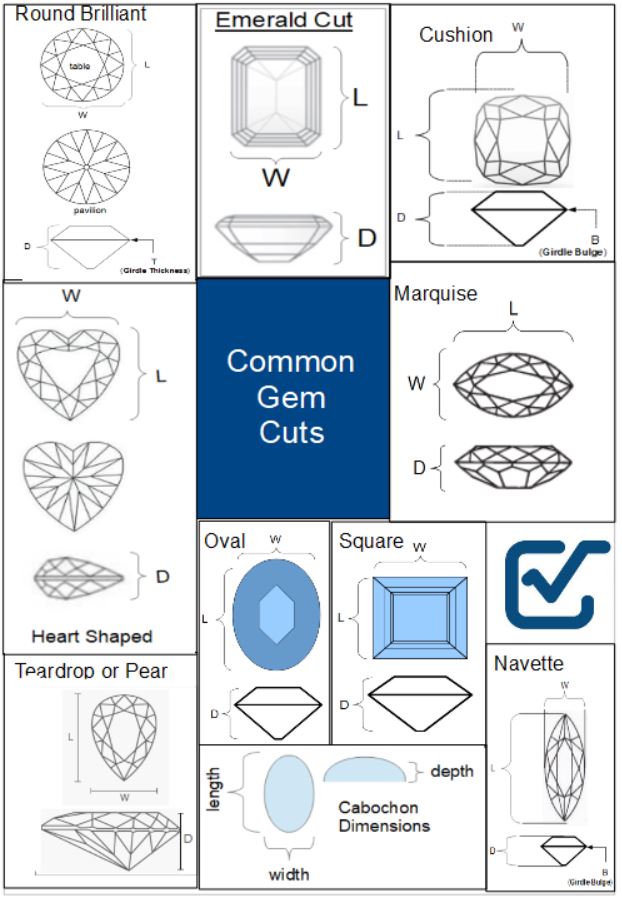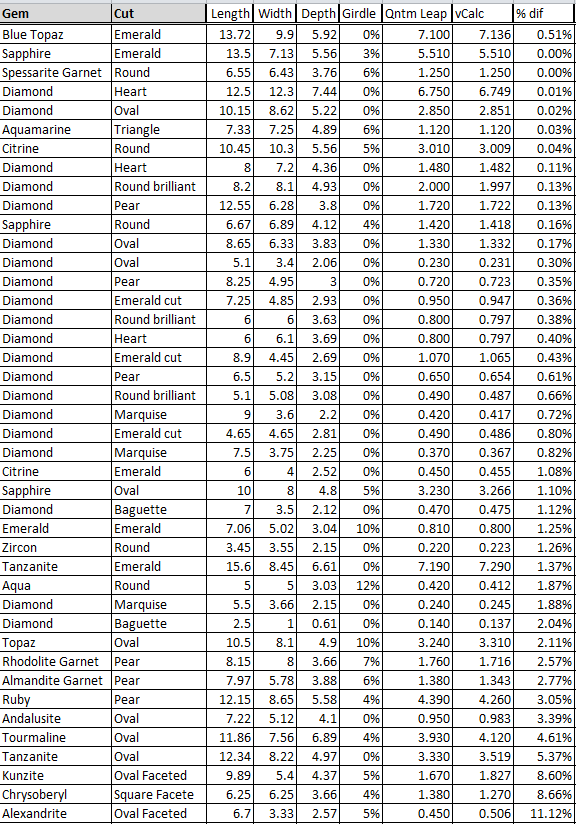The Round Faceted Gem Weight calculator computes the approximate carat weight of a Round Faceted -shaped gem based on its dimensions and type of gem (e.g. ruby).
INSTRUCTIONS: Choose units and enter the following:
- (GEM) Choose a type of gem (pull-down menu)
- (L) Length (down the face of the gem)
- (W) Width (across the face of the gem)
- (D) Depth of gem
- (BF) Percent adder for Bulge
Gem Carat Weight Estimate (Wt): The calculator returns the weight in carats. However, this can be automatically converted to compatible units via the pull-down menu.
The Math / Science
The Weight Estimate of a Round Faceted Gem formula is comparable to several industry accepted equations for the carat weight of a round faceted gem. (See verification data in the Jeweler's Calculator). The formula allows the jeweler to enter metrics (measurements) of the dimensions of the gem that can be made while the gem remains in a setting using professional grade measuring devices. Based on these metrics, this formula approximates the volume of the gem. Using the volume and the specific gravity of the type of gem, the carat weight is estimated. vCalc simplifies the use of the equation greatly by providing a pull-down list of gems, which is used to look-up the appropriate specific gravity for the gem type. The bulge factor provided has a default of zero %. It can range in percent from 0% to 6% along the following increments: 0,1,2,3,4,5,6. The bulge of the girdle is estimated by the jeweler.
This equation initially had a single diameter and not a length and width. However, in the jeweler notes that slightly irregular diameter with a differing length and width is not uncommon. For that reason, the vCalc formula includes a length and width in the volume calculation. If the gem is truly circular, simply put the same value in for length and width.
The weight of a gem is a function the volume and the specific gravity. The volume is estimated base on the gem's shape and dimensions. The specific gravity is dictated by the type of gem. For the specific gravity of different gem, CLICK HERE.
Gemstone Carat Weight Calculator:
 Weight Estimate of a Round Faceted Gem
Weight Estimate of a Round Faceted Gem- Weight Estimate of a Pear shaped or Teardrop Gem
- Weight Estimate of a Cabochon Cut Gem
- Weight Estimate of a Cushion Faceted Gem
- Weight Estimate of a Heart Shaped Gem
- Weight Estimate of an Emerald Cut Faceted Gem
- Weight Estimate of a Navette Cut Gem
- Weight Estimate of Long Rectangular Cut Gem
- Weight Estimate of Square Cut Faceted Gem
- Weight Estimate of Marquise Faceted Gem
- Weight Estimate of an Oval Faceted Gem
- Weight Estimate of Lozenge Faceted Cut Gem
Types of Gems
The gems supported in gemstone carat weight calculator include the following:
Agate, Alexandrite, Almandite garnet, Amethyst, Andalusite, Aquamarine, Aventurine, Beryl, Bloodstone, Blue Topaz, Carnelian, Cats eye, Chalcedony, Chrysoberyl, Citrine, Corundum, Demantoid Garnet, Diamond, Emerald, Golden beryl, Green beryl, Jadeite, Kunzite, Lapis Lazuli, Morganite, Nephrite Jade, Onyx, Opal, Precious topaz, Pyrope garnet, Quartz, Rhodolite garnet, Rose Quartz, Ruby, Sapphire, Sardonyx, Smokey quartz, Spessartite garnet, Spinel, Tanzanite, Topaz, Tourmaline, Tsavorite garnet, Turquoise, Yellow topaz, Zircon
ACCURACY COMPARISON
The carat weight equations and data used in vCalc's jewelry library and calculator were reviewed by a certified gemologist. The equations are based on industry recognized formulas and data. The table below shows a comparison of computations between vCalc and an industry accepted application (Quantum Leap).
The length, width and depth are in millimeters (mm), and the Quantum Leap and vCalc measurements are in carats (cwt).

The largest variance, an oval faceted alexandrite, which can be seen in the last row above, has been double checked against several source equations which tend to support vCalc's accuracy.
General Information
Equations such as this are important and useful since they provide a good means to approximate the carat weight of a gem while in a setting. It is imperative to state, approximations of the weight of a gem should never be made by formula, if a gem can be weighed independently on a professional grade jeweler's scale. However. it is often essential to provide an accurate approximation of the weight of a gem in a setting in order to assess its value. Since it is often difficult, if not impossible to damage a setting to remove its gem, these formula have been provided.
See Also
- Jewelers Calculator - Equations and data for numerous different shapes of gems (including diamonds) and formulas and real-time data for precious metals.
